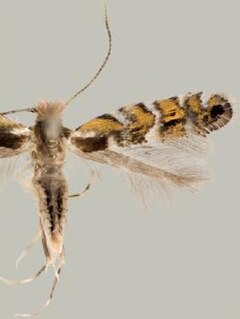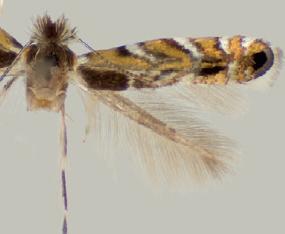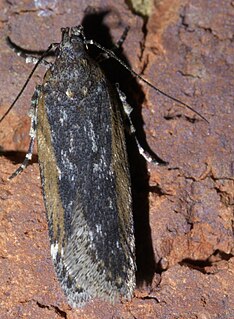
Gracillariidae is an important family of insects in the order Lepidoptera and the principal family of leaf miners that includes several economic, horticultural or recently invasive pest species such as the horse-chestnut leaf miner, Cameraria ohridella.

Macrosaccus robiniella is a moth of the family Gracillariidae.

Macrosaccus morrisella is a moth of the family Gracillariidae. In North America it is known from Manitoba, Ontario, and Quebec, south and west to Texas and Colorado.

Macrosaccus uhlerella is a moth of the family Gracillariidae. It is known from Illinois, Missouri, New York, Colorado and Texas in the United States.
Cameraria lobatiella is a moth of the family Gracillariidae. It is known from British Columbia in Canada, and California in the United States.
Cameraria sadlerianella is a moth of the family Gracillariidae. It is known from California and Oregon in the United States.
Cameraria temblorensis is a moth of the family Gracillariidae. It is known from California, United States.
Cameraria diabloensis is a moth of the family Gracillariidae. It is known from the California, United States.
Cameraria shenaniganensis is a moth of the family Gracillariidae. It is known from California, United States.
Cameraria jacintoensis is a moth of the family Gracillariidae. It is known from California, United States.
Cameraria serpentinensis is a moth of the family Gracillariidae. It is known from California, United States.
Cameraria marinensis is a moth of the family Gracillariidae. It is known from California, United States.
Cameraria sempervirensella is a moth of the family Gracillariidae. It is known from California, United States.
Eucosmophora manilkarae is a moth of the family Gracillariidae. It is known from Florida and Texas in the United States.

Phyllocnistis hyperpersea is a moth of the family Gracillariidae. It is found from Nansemond and Virginia Beach Counties in Virginia, south along the lowland Atlantic coastal region to the Florida Everglades. It might have a much wider range, since material which might belong to this species has been recorded from Honduras and Mexico.

Lithocolletinae is a subfamily of insects in the moth family Gracillariidae. It is distributed worldwide, with most species in temperate regions.

Macrosaccus is a genus of moths in the family Gracillariidae.

Macrosaccus gliricidius is a moth of the family Gracillariidae. It is known from Central America and the West Indies.

Filatima pseudacaciella, the dusky-backed filatima moth, is a moth of the family Gelechiidae. It is found in North America, where it has been recorded from California, Illinois, Indiana, Kansas, Kentucky, Louisiana, Maine, Massachusetts, Mississippi, New Hampshire, New York, Ohio, Oklahoma, Ontario, Tennessee and West Virginia.
Macrosaccus coursetiae is a moth of the family Gracillariidae. It is known from Arizona in the United States.






